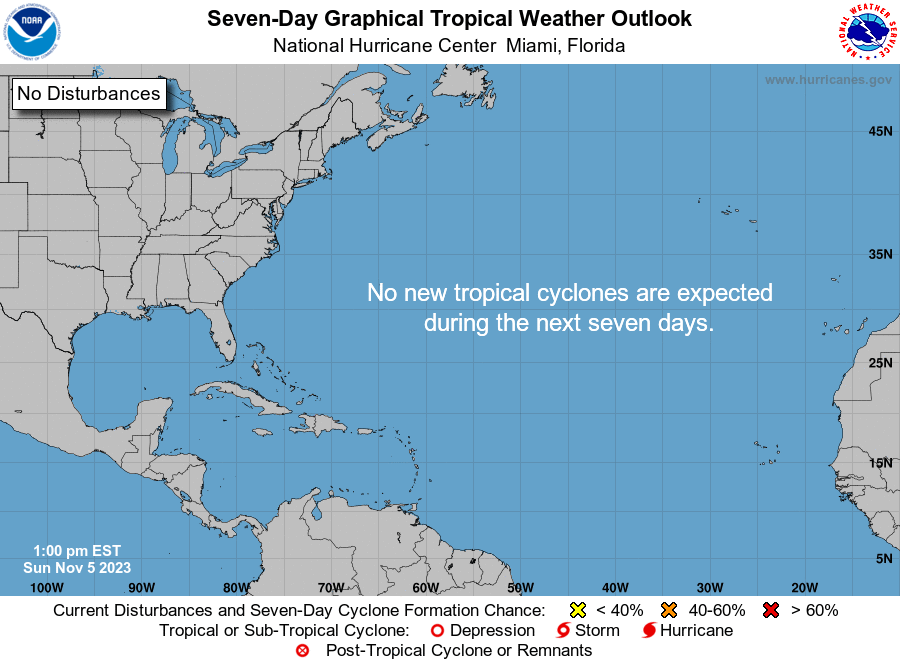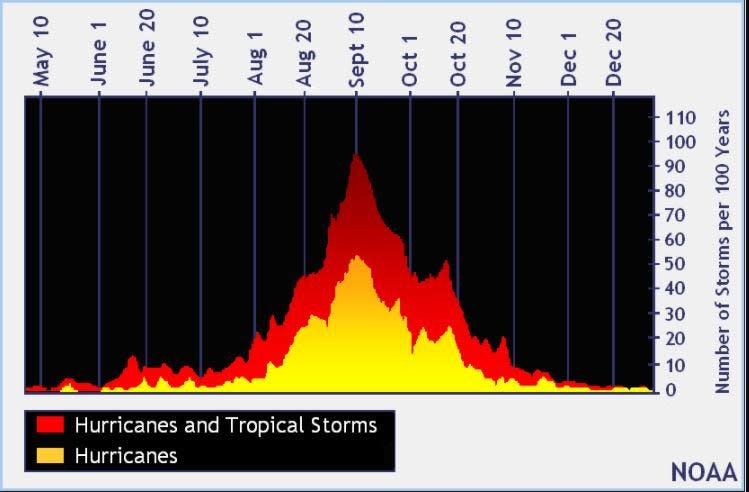The tropics remained calm as a sales tax holiday for hurricane and other disaster supplies kicked off Saturday, but severe weather could affect portions of Florida over the weekend.
Tropical cyclone activity is not expected over the next seven days, the National Hurricane Center reported in its latest update.
➤ Weather alerts via text: Sign up to get updates about current storms and weather events by location
However, the hurricane center is tracking 2 tropical waves: one off the coast of Africa and one in the Caribbean Sea.
The next named storm of the 2024 Atlantic Hurricane season will be Francine.
Parts of Florida can expect to see thunderstorms with heavy downpours this weekend. Flash floods and waterspouts along the coast are possible, according to AccuWeather’s latest report.
“Light steering winds over Florida will mean that thunderstorms will be slow-moving and unload a tremendous amount of rain,” AccuWeather Meteorologist Brandon Buckingham said, “Rainfall rates of 2 inches per hour can occur, which is enough to trigger flash urban flooding and possibly block some roads with high water.”
➤ Track all active storms
Meanwhile, Florida’s second Disaster Preparedness Sales Tax Holiday of the year began today and runs through Friday, September 6. The first exemption period was June 1-14.
According to the Florida Department of Revenue, consumers can purchase qualifying disaster preparedness supplies exempt from sales tax during the 2024 Disaster Preparedness Sales Tax Holiday.
Florida hurricane tax free holiday for disaster supplies 2024
Eligible items for the tax-free holiday include:
-
A portable generator used to provide light or communications or preserve food in the event of a power outage with a sales price of $3,000 or less.
-
A tarpaulin or other flexible waterproof sheeting with a sales price of $100 or less.
-
An item normally sold as, or generally advertised as, a ground anchor system or tie-down kit with a sales price of $100 or less.
-
A smoke detector or smoke alarm with a sales price of $70 or less.
-
A fire extinguisher with a sales price of $70 or less.
-
A carbon monoxide detector with a sales price of $70 or less.
-
A nonelectric food storage cooler with a sales price of $60 or less.
-
A portable power bank with a sales price of $60 or less.
-
A gas or diesel fuel tank with a sales price of $50 or less.
-
A portable self-powered radio, two-way radio, or weather-band radio with a sales price of $50 or less.
-
A package of AA-cell, AAA-cell, C-cell, D-cell, 6-volt, or 9-volt batteries, excluding automobile and boat batteries, with a sales price of $50 or less.
-
A portable self-powered light source (powered by battery, solar, hand-crank, or gas) with a sales price of $40 or less, including: flashlights, lanterns and candles.
-
Eligible light sources and radios qualify for the exemption, even if electrical cords are included in the purchase.
-
Reusable ice (ice packs) with a sales price of $20 or less.
➤ Full list of items exempt from sales tax
Watching the tropics: What’s out there and how likely are they to strengthen?
-
First wave: An Atlantic Ocean tropical wave is near 40W, from 20N southward, moving westward at 11 to 17 mph.
-
Second wave: A Caribbean Sea tropical wave is near 84W, from 22N southward, moving westward at 17 mph. Scattered moderate and isolated strong convection is noted in the vicinity of the wave axis over the NW Caribbean.
National Hurricane Center map
No tropical cyclone activity is currently expected or monitored by the National Hurricane Center.

Weather watches and warnings issued in Florida
Excessive rainfall forecast
When is hurricane season in Florida?
The Atlantic hurricane season is from June 1 to Nov. 30 every year, with the most active part of the season between August and October.
When is the peak of hurricane season?


The peak of the season is Sept. 10, with the most activity happening between mid-August and mid-October, according to the National Hurricane Center.
What’s next?
We will continue to update our tropical weather coverage daily. Download your local site’s app to ensure you’re always connected to the news. And look for our special subscription offers here.
Contributing: Cheryl McCloud, USA TODAY Network-Florida
This article originally appeared on Fort Myers News-Press: Tropics update: NHC tracking 2 waves. Florida tax free holiday begins















